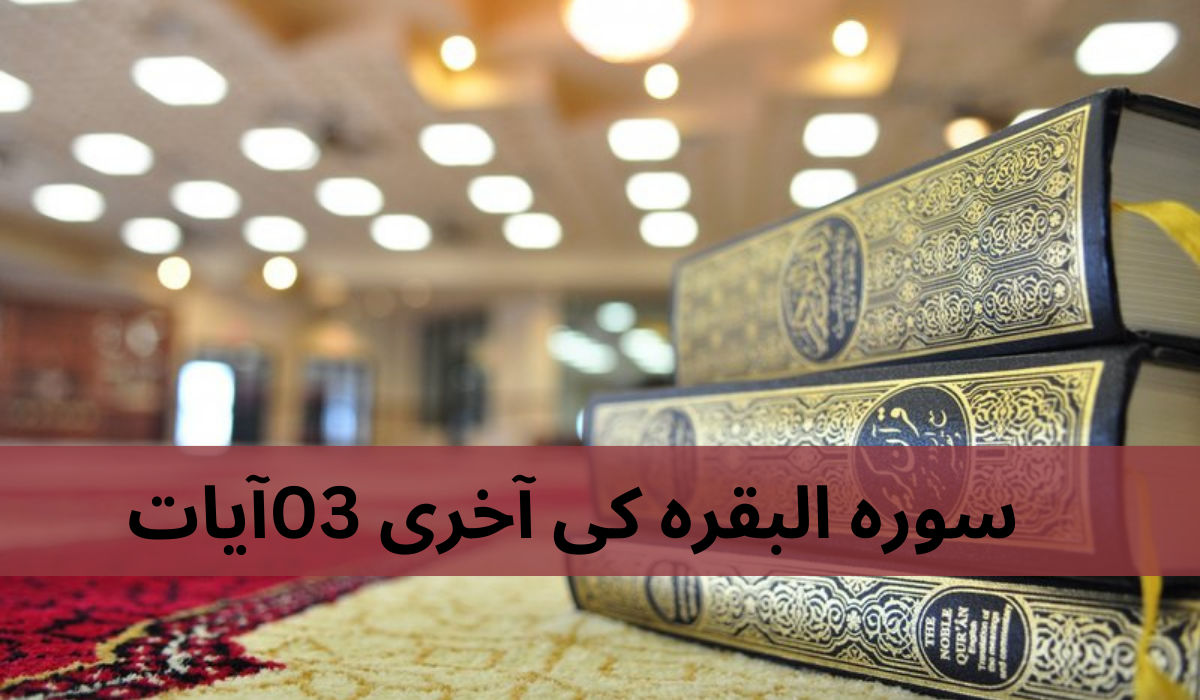Last Three Ayat Of Surah Baqarah Recite Online

Last Three Ayat Of Surah Baqarah Recite Online The last three verses of Surah Al-Baqarah (Chapter 2) in the Quran are considered to be of great significance in Islamic tradition. They offer guidance and supplication to believers. Here’s a paragraph explaining their meaning and importance.
Last Three Ayat Of Surah Baqarah Recite Online
The last three verses of Surah Al-Baqarah (2:284-286) serve as a profound conclusion to this chapter, encapsulating essential principles of faith and practice. In these verses, believers are reminded of the comprehensive knowledge and wisdom of Allah, who knows all that is hidden and apparent. They are encouraged to have faith in the message of the Prophet Muhammad (peace be upon him) and the scriptures preceding the Quran.
The concluding verse (2:286) contains a heartfelt supplication, where believers seek Allah’s forgiveness, guidance, and protection from trials and tribulations. These verses emphasize the importance of faith, gratitude, and reliance on Allah in a believer’s life, providing a spiritual compass for their journey of faith. Consequently, they are often recited in various prayers and occasions to seek Allah’s blessings and guidance.
The Last Three Ayat Is Very Important For This
The last three verses of Surah Al-Baqarah (Chapter 2) in the Quran are particularly important for several reasons:
- Comprehensive Guidance: These verses encapsulate essential principles of faith and practice in Islam. They touch upon faith in the unseen, the importance of following the Prophets and believing in all of them, and the significance of prayer and supplication.
- Theological Significance: These verses affirm Allah’s all-encompassing knowledge and wisdom. They emphasize that Allah knows everything, whether it’s hidden or apparent. This serves as a reminder of Allah’s attributes and His role as the ultimate source of guidance and wisdom.
- Supplication (Dua): The last verse (2:286) contains a heartfelt supplication that is powerful and meaningful for Muslims. It is a prayer asking Allah for His forgiveness, guidance, and protection from trials and tribulations. This dua is considered to be a profound expression of a believer’s reliance on Allah for guidance and protection.
- Practical Guidance: The last three verses offer practical guidance to believers. They highlight the importance of recognizing the Prophets and Scriptures that have come before, reinforcing the unity of the message throughout history. They also emphasize the significance of prayer and seeking Allah’s help in all aspects of life.
- Spiritual Significance: These verses provide a spiritual compass for believers, reminding them of their fundamental beliefs and values. They inspire gratitude, humility, and reliance on Allah, encouraging believers to turn to Him in times of need and to seek His guidance and forgiveness.
- Frequent Recitation: Due to their importance and the spiritual guidance they offer, these verses are often recited in various daily prayers, especially during the nightly prayers (Tahajjud) and other occasions. Muslims recite them to seek Allah’s blessings, protection, and guidance.
In summary, the last three verses of Surah Al-Baqarah are important because they provide comprehensive guidance, emphasize key theological concepts, contain a powerful supplication, offer practical advice for believers, and serve as a source of spiritual inspiration and connection with Allah. Their significance is deeply rooted in the core principles of Islamic faith and practice.
Read The Last Three Ayat Of Surah Al Baqara
﷽
لِلَّهِ مَا فِي السَّمَاوَاتِ وَمَا فِي الْأَرْضِ ۗ وَإِنْ تُبْدُوا مَا فِي أَنْفُسِكُمْ أَوْ تُخْفُوهُ يُحَاسِبْكُمْ بِهِ اللَّهُ ۖ فَيَغْفِرُ لِمَنْ يَشَاءُ وَيُعَذِّبُ مَنْ يَشَاءُ ۗ وَاللَّهُ عَلَىٰ كُلِّ شَيْءٍ قَدِيرٌ ﴿284﴾ آمَنَ الرَّسُولُ بِمَا أُنْزِلَ إِلَيْهِ مِنْ رَبِّهِ وَالْمُؤْمِنُونَ ۚ كُلٌّ آمَنَ بِاللَّهِ وَمَلَائِكَتِهِ وَكُتُبِهِ وَرُسُلِهِ لَا نُفَرِّقُ بَيْنَ أَحَدٍ مِنْ رُسُلِهِ ۚ وَقَالُوا سَمِعْنَا وَأَطَعْنَا ۖ غُفْرَانَكَ رَبَّنَا وَإِلَيْكَ الْمَصِيرُ ﴿285﴾ لَا يُكَلِّفُ اللَّهُ نَفْسًا إِلَّا وُسْعَهَا ۚ لَهَا مَا كَسَبَتْ وَعَلَيْهَا مَا اكْتَسَبَتْ ۗ رَبَّنَا لَا تُؤَاخِذْنَا إِنْ نَسِينَا أَوْ أَخْطَأْنَا ۚ رَبَّنَا وَلَا تَحْمِلْ عَلَيْنَا إِصْرًا كَمَا حَمَلْتَهُ عَلَى الَّذِينَ مِنْ قَبْلِنَا ۚ رَبَّنَا وَلَا تُحَمِّلْنَا مَا لَا طَاقَةَ لَنَا بِهِ ۖ وَاعْفُ عَنَّا وَاغْفِرْ لَنَا وَارْحَمْنَا ۚ أَنْتَ مَوْلَانَا فَانْصُرْنَا عَلَى الْقَوْمِ الْكَافِرِينَ ﴿286
Benefits Of This
The last three verses of Surah Al-Baqarah (2:284-286) in the Quran are believed to carry several benefits and blessings for those who recite them, reflect upon their meanings, and incorporate their teachings into their lives. Here are some of the benefits associated with these verses:
- Spiritual Connection: Reciting these verses helps strengthen a believer’s spiritual connection with Allah. The heartfelt supplication (dua) in verse 2:286 serves as a direct conversation with Allah, fostering a sense of closeness and dependence on Him.
- Guidance and Wisdom: These verses contain profound wisdom and guidance, reminding believers of important principles of faith and practice. Regular recitation and reflection upon them can deepen one’s understanding of Islam and its teachings.
- Protection from Trials: Seeking Allah’s protection from trials and tribulations (fitnah) is a central theme in verse 2:286. Believers recite this verse to seek Allah’s safeguarding against life’s challenges, both spiritual and worldly.
- Forgiveness: The dua in the last verse (2:286) seeks Allah’s forgiveness. By reciting this verse sincerely, believers express their remorse for their sins and ask for Allah’s mercy and forgiveness.
- Gratitude and Humility: These verses encourage believers to be grateful for Allah’s blessings and to approach Him with humility and reliance. Practicing gratitude is known to improve one’s overall well-being and mental health.
- Unity of Faith: The acknowledgment of all Prophets and Scriptures in these verses reinforces the unity of faith throughout history. It reminds believers of the continuity of divine guidance and the importance of recognizing all the Prophets.
- Positive Mindset: Reciting these verses can promote a positive mindset, as they encourage believers to focus on faith, trust in Allah’s wisdom, and seek His guidance rather than dwelling on anxieties and worries.
- Protection from Evil: Seeking Allah’s protection from evil (including the evil of one’s own self) is a recurring theme in these verses. Believers recite them to shield themselves from negative influences and thoughts.
- Inner Peace: The act of reciting and reflecting upon these verses can provide inner peace and tranquility, as it reminds believers that Allah is the ultimate source of guidance, protection, and peace.
- Regular Connection with Quran: Reciting these verses as part of daily prayers or supplications helps maintain a regular connection with the Quran, the central religious text in Islam. This connection can deepen one’s faith and understanding of the Quranic teachings.
It’s important to note that the benefits of these verses go beyond the physical act of recitation; sincere reflection and application of their teachings in one’s life are equally important. Muslims often incorporate these verses into their daily spiritual practices to seek Allah’s guidance, protection, and forgiveness while strengthening their faith and connection with Him.
Conclusion
In conclusion, the last three verses of Surah Al-Baqarah (2:284-286) in the Quran hold great importance and offer numerous benefits to those who engage with them. These verses provide comprehensive guidance, emphasizing faith, gratitude, humility, and reliance on Allah. They contain a heartfelt supplication, serving as a direct conversation with Allah.
Benefits of reciting and reflecting upon these verses include strengthening one’s spiritual connection with Allah, seeking His guidance and protection, fostering gratitude and humility, and promoting a positive mindset. Additionally, these verses remind believers of the unity of faith throughout history and the importance of recognizing all the Prophets and Scriptures. Ultimately, incorporating these verses into one’s daily spiritual practice can lead to inner peace, a deeper understanding of Islamic teachings, and a stronger connection with the Quran.
